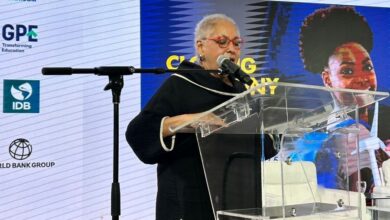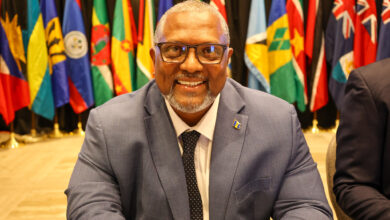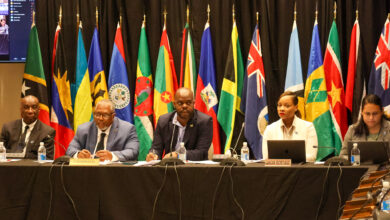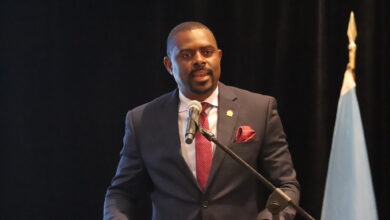(CARICOM Secretariat, Turkeyen, Greater Georgetown, Guyana) Chair of the Caribbean Community (CARICOM), The Hon. Kamla Persad-Bissessar, Prime Minister of Trinidad and Tobago, has affirmed the strength of the integration movement, and has urged a demonstration of steadfastness to make CARICOM an “even greater force within the world community.”
Prime Minister Persad-Bissessar said the journey to that milestone was punctuated with accomplishments in education evinced by the Caribbean Examination Council, in health, illustrated in the successes of the Pan Caribbean Partnership for HIV and AIDS, in the global recognition of CARICOM’s leadership in arresting the scourge of Non-Communicable Diseases, through foreign policy coordination and security, which was elevated as the fourth pillar of CARICOM.
As the regional integration movement reached for even higher ideals within an ever-changing global environment, the Chair said that the current reform process was a direct attempt to bring about the institutional and structural transformations needed to give CARICOM more relevance. Within that context, she made the case for closer embrace into the CARICOM family of the Dominican Republic, the Dutch and French Caribbean islands.
“The Caribbean Sea unites us; it must never divide us,” the host Prime Minister stated on Wednesday against the backdrop of the opening ceremony of the 34th Conference of Heads of Government, which coincided with the 40th Anniversary of regional integration,.
Underscoring the critical importance of the historic gathering in Port-of-Spain, Trinidad and Tobago, she said the extensive agenda, which spawned the peculiar challenges faced by Small Island Developing and Low-lying Coastal States (SIDS), necessitated robust deliberations on regional growth and development, which formed part of the region’s Five-Year Community Strategic Plan.
Given the size, remoteness, limited resource and export base, exposure to global environmental challenges and external economic shocks felt by CARICOM’s membership, the establishment of a regional task force to deal with its strategic priorities in the post-2015 development agenda of the United Nations, was paramount, the Chair said.
Prime Minister Persad-Bissessar said she was hopeful that continued dialogue and collaboration on regional security would produce “fresh initiatives and perspectives” in combating threats to regional security including the penetration of our porous borders by organized criminals, the proliferation of small arms, the increase in drug and human trafficking, money laundering and corruption at ports of entry.
Calling for the establishment of a regional think tank on security, she said: “We must develop the regional mechanisms to combat the multiple threats to security in this hemisphere. Our people must be safe and feel safe… We have an obligation as leaders to ensure that our people are secure by demonstrating that we engage in a focused and effective war on crime and criminals…We must also attack crime at the root, which means we must develop approaches to combat poverty, unemployment, illiteracy and the rising cost of living.”
The Prime Minister’s sentiments that CARICOM was united resonated with the CARICOM Secretary-General, Ambassador Irwin LaRocque who said: “there is much to celebrate at this milestone in our integration process. We have persevered. We have kept the faith. We have demonstrated clearly the benefits of our co-operation and collaboration. We have responded, time and again to whatever challenges were before us, and used our unity to exercise influence in the global diplomatic arena way above our size.”
“Today, we can boast of being the longest surviving integration grouping among developing countries and second only to the European Union in global terms. The programmes of functional co-operation and common services have deepened and expanded in health, disaster management, agriculture, the environment and education to name a few,” Secretary-General LaRocque said.
A significant product of regional co-operation, he added, was the preservation of the concept of negotiating as a bloc that has produced trade agreements with six countries and numerous technical co-operation agreements.
Tracing the path of developments which occurred after the landmark 1989 Grand Anse Declaration, which included the introduction of the CARICOM Single Market and Economy, and embracing Haiti, Suriname and the five Associate Members into the CARICOM family, Mr. LaRocque said the vision of the leaders at that time, triggered events from which results resonated to this day. That included adopting Security as the fourth pillar and maintaining the architecture that was established during the 2007 Cricket World Cup; and the establishment of Caribbean Court of Justice which give interpretation of provisions of the 2001 Revised Treaty.
Trumpeting other accomplishments, Ambassador LaRocque said intra-regional trade, further advanced by the CSME, has grown from US$600 million in 1990 to more than US$3 billion in 2012 moving from 10 percent of total trade to 15 percent.
“As we celebrate 40 Years of Integration under the theme, Celebration and Renewal, it is clear from what I have outlined above that we have a lot to celebrate as substantial progress has been made in our integration movement.
However, we are also certain that more could have been done and we are all aware of the shortcomings that we must address,” the Secretary-General stated.
In recognition of the foregoing, he reiterated the sentiments of Prime Minister Persad-Bissessar, noting that the reform process would give greater relevance to CARICOM, and importantly, would ensure that the integration construct could “deliver even more tangible benefits going forward.”
“Relevance, efficiency, effectiveness, flexibility, responsiveness, innovation and creativity, all aimed at providing improved service to our people, is the goal of this reform process. The people-centred approach to development is the driver of the change that we are striving to provide. It is at the heart of our integration arrangements and our agenda item at this meeting on treatment of persons with disabilities demonstrates our continued concern at the highest level for the welfare of our citizens,” Secretary-General LaRocque said.





